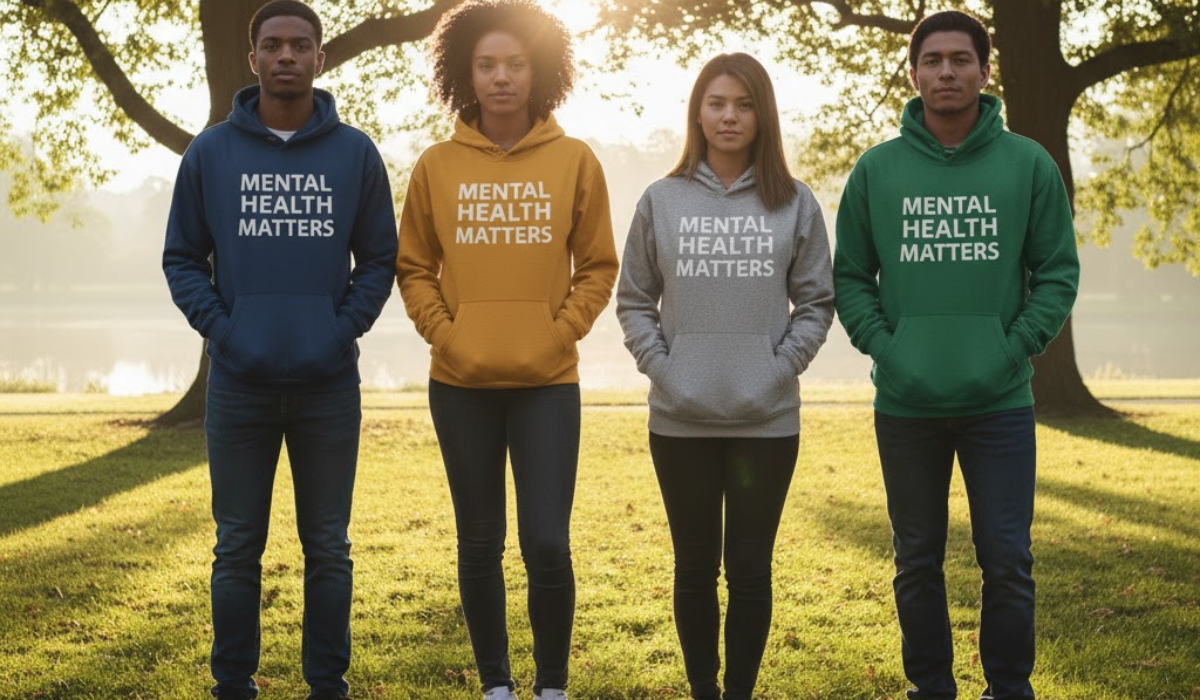In today’s fast-paced world, conversations about mental health are becoming increasingly important. One symbol that has gained recognition in this movement is the “Mental Health Matters hoodie.” While at first glance it may seem like just another piece of clothing, it represents far more than fabric and design — it’s a statement, a reminder, and a movement towards compassion and understanding.
This article explores what the “mental health matters hoodie” symbolizes, why it resonates with so many people, and how clothing can be used as a medium to promote awareness and emotional well-being.
Understanding the Message: “Mental Health Matters”
The phrase “mental health matters” carries deep meaning. It’s a declaration that emotional and psychological well-being are just as important as physical health. Historically, mental health was often ignored, stigmatized, or misunderstood. However, the global rise in anxiety, depression, and stress-related conditions has forced societies to confront these issues openly.
By wearing a hoodie with the message Mental Health Matters, individuals aren’t just making a fashion choice — they’re contributing to a cultural shift. It’s a way of saying, “I see you. I care. And it’s okay to talk about mental health.”
The hoodie becomes a conversation starter, allowing people to express solidarity with those who may be struggling silently.
The Power of Clothing as Expression
Clothing has long been used as a tool of self-expression and social communication. From political slogans to charity campaigns, apparel can carry powerful messages. A Mental Health Matters hoodie works similarly — it transforms a casual garment into a tool for awareness.
People often wear these hoodies to show support for mental health advocacy, self-care, or recovery. The act of putting it on can be symbolic — a daily reminder to be gentle with oneself or an invitation for others to speak openly.
In psychology, this idea aligns with symbolic interactionism, where objects gain meaning through human interpretation and interaction. The hoodie is not just fabric; it’s a wearable message of empathy.
Cultural Shift: From Silence to Openness
For many years, mental health conversations were confined to private therapy rooms or whispered discussions. But in recent decades, public dialogue has evolved. Celebrities, athletes, educators, and organizations have begun using their platforms to promote awareness.
Wearing a Mental Health Matters hoodie fits into this cultural transformation. It’s an act of destigmatization — normalizing what was once taboo. When people see others wearing it, they are reminded that it’s acceptable to discuss feelings, seek help, and prioritize emotional well-being.
In workplaces, schools, and online spaces, such visual symbols help break down barriers. They show that mental health is a shared human experience, not a personal flaw or weakness.
Psychological Meaning of Wearing Awareness Clothing
There’s a psychological element to why people choose to wear clothing with messages like “mental health matters.” It can create a sense of belonging, purpose, and empowerment.
For someone struggling with anxiety or depression, wearing such a hoodie might be a small but significant step toward reclaiming their identity and voice. For others, it can serve as a reminder to approach people with compassion rather than judgment.
Research in social psychology suggests that clothing can influence mindset and confidence — a concept known as enclothed cognition. When individuals wear garments that carry positive or meaningful messages, it can subtly enhance their emotional resilience and empathy.
Community and Connection
The mental health community often thrives on shared experiences and emotional connection. Whether it’s online through mental health advocacy groups or local awareness events, the sense of unity helps reduce isolation.
The Mental Health Matters hoodie has become part of this identity — a simple yet effective way for individuals to identify with a collective cause. When someone spots another person wearing the same message, it can spark a silent understanding: “You get it too.”
This mutual recognition builds bridges between strangers and fosters a supportive environment. Sometimes, just knowing others care enough to wear a message can make a difference to someone feeling unseen or unheard.
Mindfulness and Everyday Awareness
Beyond advocacy, the act of wearing the hoodie can serve as a mindfulness practice. It reminds both the wearer and the observer to slow down, breathe, and reflect on mental well-being.
Every time someone sees the words Mental Health Matters, it plants a small seed of awareness. It might inspire someone to check in on a friend, practice self-care, or seek professional help. Small moments of awareness accumulate to create meaningful social change.
In that sense, the hoodie functions not only as a garment but as a gentle prompt to prioritize mental balance in a chaotic world.
Educational and Social Impact
Many educators, counselors, and youth leaders have embraced the idea of wearing or distributing clothing with mental health messages. For students, it opens conversations that might otherwise feel uncomfortable. For organizations, it becomes a visual reminder of inclusion and empathy.
Social initiatives around mental health clothing also raise funds for non-profit organizations, research, or community programs — but even without the fundraising element, the educational value is immense. It helps normalize discussions about therapy, coping mechanisms, and emotional literacy.
The long-term impact of these efforts can be seen in changing attitudes toward mental illness. What once evoked shame now sparks understanding. And that is how societies heal — through conversation, education, and shared symbols of care.
Sustainability and Ethical Choices
Interestingly, many people who wear the Mental Health Matters hoodie also advocate for mindful consumerism. The intersection between mental wellness and sustainability is growing — both emphasize mindfulness, awareness, and responsibility.
Ethically made, comfortable, and inclusive clothing aligns with the same values mental health awareness promotes: compassion, self-respect, and empathy for others. Whether one buys or designs such apparel, the focus remains on intention — to spread kindness, not consumerism.
A Symbol Beyond Fashion
Ultimately, the Mental Health Matters hoodie is not about style; it’s about substance. It serves as a wearable reminder that:
- Everyone has mental health, just as everyone has physical health.
- It’s okay to talk about feelings, vulnerability, and struggle.
- Compassion and understanding should be the foundation of modern communities.
When more people embrace these values, the message grows stronger. It’s not just a hoodie anymore — it’s a symbol of human connection and healing.
Informational FAQs
1. What does the phrase “Mental Health Matters” mean?
It emphasizes the importance of mental and emotional well-being as a vital part of overall health. It’s a reminder that mental health deserves care, attention, and open conversation.
2. Why do people wear the Mental Health Matters hoodie?
People wear it to express solidarity, raise awareness, and start conversations about mental health. It also serves as a reminder to practice self-care and empathy.
3. Is the hoodie only for those who have mental health struggles?
No. It’s for everyone — supporters, advocates, educators, and anyone who believes in destigmatizing mental health discussions.
4. How can clothing help in promoting awareness?
Clothing is a visible form of expression. When people wear awareness-based apparel, it normalizes the topic, making it easier for others to engage in dialogue.
5. How can we further support mental health awareness beyond clothing?
You can participate in community events, share educational resources, support mental health organizations, and simply check in on people around you.
6. Why is destigmatization important?
Reducing stigma allows more people to seek help without fear of judgment, leading to earlier intervention, better recovery, and a more compassionate society.

